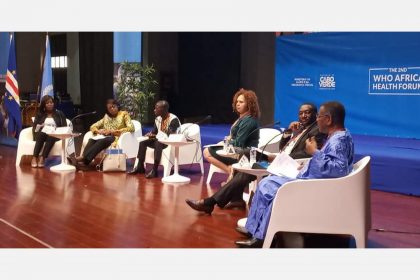
The 2nd African Health Forum, a joint organisation between the Government of Cape Verde and the World Health Organisation, took place in the city of Praia from 26 to 29 March, under the theme “Achieving universal health and safety coverage: the Africa we want to see”. The Forum was an important stage for discussion and brought together over 300 participants from different latitudes.
Multisectorality and intersectorality are essential pillars of the WHO Healthy Cities approach and the case of Cape Verde, unique in Africa, has attracted the interest and support of WHO and, in particular, the Regional Director of WHO Africa, who wants our case to inspire other African countries.
Thus, at the invitation of Her Excellencies the WHO Regional Director for Africa and the Minister of Health, the Healthy Cities Implementation Support Unit has formed part of an important panel, presented in plenary, on the theme: Multisectoral collaboration to improve health outcomes.
The panel was thus formed:
PALESTRANTS
– Matshidiso Moeti, WHO Regional Director for Africa
– Helena Rebelo Rodrigues, Coordinator of the Healthy Cities Implementation Support Unit, Cape Verde
– Felix Dounia Millimono, Leader, African Youth and Adolescent Network
– Abdouraman Bary: Programme Officer, United Nations Environment Programme Regional Office for Africa
The panel highlighted multisectorality and intersectorality as essential pillars of development based on the 2030 Agenda for Sustainable Development. It stressed the importance of the health sector being aligned with other development sectors and analysed multi-sectoral collaboration to improve the actions implemented. They identified the strengths and weaknesses of the partners and discussed how policy barriers to implementation can be removed through collaboration, facilitating increased impacts.
The main findings recognize multi-sectoral collaboration as fundamental to significant progress towards health security and the CUS. Efforts to promote the Health in All Policies approach and to improve intersectoral action and policy coherence to enhance health outcomes must continue.
The main gains are in terms of results:
– The inclusion in the final Recommendations of the commitment to multi-stakeholder collaboration and the Health in All Policies approach to achieve the Sustainable Development Goals.
– The interest, of several guests at this major event, namely the rulers of Nigeria and Angola, to learn more about Cape Verde’s experience in the implementation process of the Healthy Cities and Islands project.
